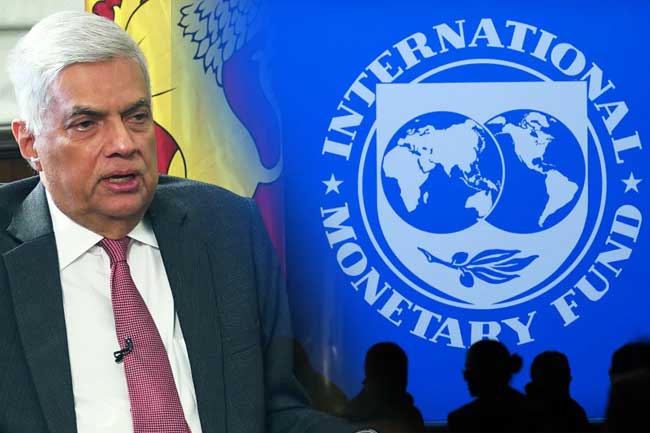President Ranil Wickremesinghe by his own admission during an interview with a journalist in Germany said that politics is a game for him. He boasted that he knows it well. With his vision comes his governance. Desperate Sri Lankans experience it on daily basis. Quite contrary to his cheap vision, the IMF insists throughout its Governance Diagnostic Assessment report issued in the end of September, 2023 that politics and governance is not a cheap game but a process that supports for sound fiscal planning which sets the foundation of effective control of public funds ensuring transparency, minimizing risks of corruption at every level, prevents breaching fiscal rules, ensure political stability with proper democratic process to face severe economic, social and governance challenges. None of these is a game.
But Ranil plays a game. IMF indirectly explains how he does it. Corrupt budgeting process is the beginning of his game. Let me give you an example. The government allocates funds in the budget to hold elections. This budget was approved by parliament too. Then the secretary of the Ministry of Finance goes to courts and tells them that there are not enough funds to hold the election. How can this be possible? IMF’s answer is the corrupt budgeting practice. But it is written in IMF’s technical language.
Kindly read carefully. IMF explains that “an effective budget process supports sound fiscal planning and sets the foundation for effective control as well as transparency. To enable sound fiscal planning, the budget should be based on a medium-term fiscal framework that is informed by reliable forecasts and analysis of risk. The budget should comprehensively cover all of the general government sector to ensure full transparency of fiscal planning and other policy interventions. The budget should be prepared through a defined, transparent and timely process to respect the authority of Parliament to approve the budget and to hold budget entities to account for use of resources. Deviations from those principles increase bad fiscal governance and corruption risks.” (Page 56, subsection 125, “Sri Lanka Governance Diagnostic Assessment”, IMF, Sept. 2023. The word in italic in the above quote is inserted by the author of this article).
What does this say? It says that, if the budget is prepared to cover the government sector to ensure transparency respecting the authority of parliament to approve it, the election commission being a budget entity has to account for use of allocated resources. This did not happen. In other words, the secretary of the Ministry of Finance literarily tells the court that the government’s budget process does not support sound fiscal planning and does not set the foundation for effective control and transparency. That’s why the treasury does not have funds to hold elections. Bad budgeting process that did not support sound fiscal planning led to the political game of not holding elections.
IMF noticed it. In its Governance Diagnostic report, the IMF says that among many other reasons for popular discontent, the postponement of local government elections has been a source of popular discontent.” (Page 11).
IMF further insists that “Corruption risks emerge when the budget is not credible. Risks are generated if the executive arm of government is able to spend in excess of budget limits. In such conditions, projects and activities can be funded without due consideration of costs and benefits, and without external scrutiny and oversight by the Parliament.” A recent case was that a few member parliamentarians had gone to New York for the U.N. General Assembly. Nobody knows how their expenditure got covered.
Other bad repercussions of this practice are explained by IMF as follows. “Where there is consistent overestimation of revenue, this typically results in pressure being applied to enhance revenue collections via administrative actions, which can result in deviations from tax policy and collection procedures, creating an environment conducive to subjective actions by tax assessors that raises corruption risk. Where expenditure allocations in the budget are not aligned with underlying cost structures this results in the need for administrative level adjustments during budget execution, where associated approval requirements create a corruption risk. In addition, unrealistic expenditure plans in budgets can create situations whereby payments are rationed by the executive due to a lack of liquidity, creating a situation in which suppliers are required or encourage to offer bribes in order to have their payments prioritized.” The message is clear. IMF wants proper procedure in budgeting and use allocated funds by budget entities.
IMF has checkmated executive branch preventing another bad practice. The IMF says that there exists a range of funds outside of the Consolidated Fund which are not covered by the budget. The budget, therefore, provides incomplete information on the use of all public funds, fiscal policy setting, and equally incomplete transparency regarding public revenue and spending. The risk of corruption is exacerbated as off-budget funds are typically not subject to standard internal control procedures, have limited transparency and do not receive the same level of external oversight as applied to budget entities. The IMF’s message is to stop this game of having funds outside the Consolidated Fund.
Similarly, the IMF’s Governance Diagnostic Assessment revealed systematic and severe governance weaknesses and corruption vulnerabilities across state functions that have broader macroeconomic impact. The IMF demands fixing them.
Conclusively the IMF says that “regular civil society participation in oversight and monitoring of government actions is restricted by limited transparency, the lack of platforms for inclusive and participatory governance, and by broad application of counter-terrorism rules.” (Page 11, GDA report). Indirectly, all these mean that Ranil’s style of suppressive governance is a scam if not a game.


